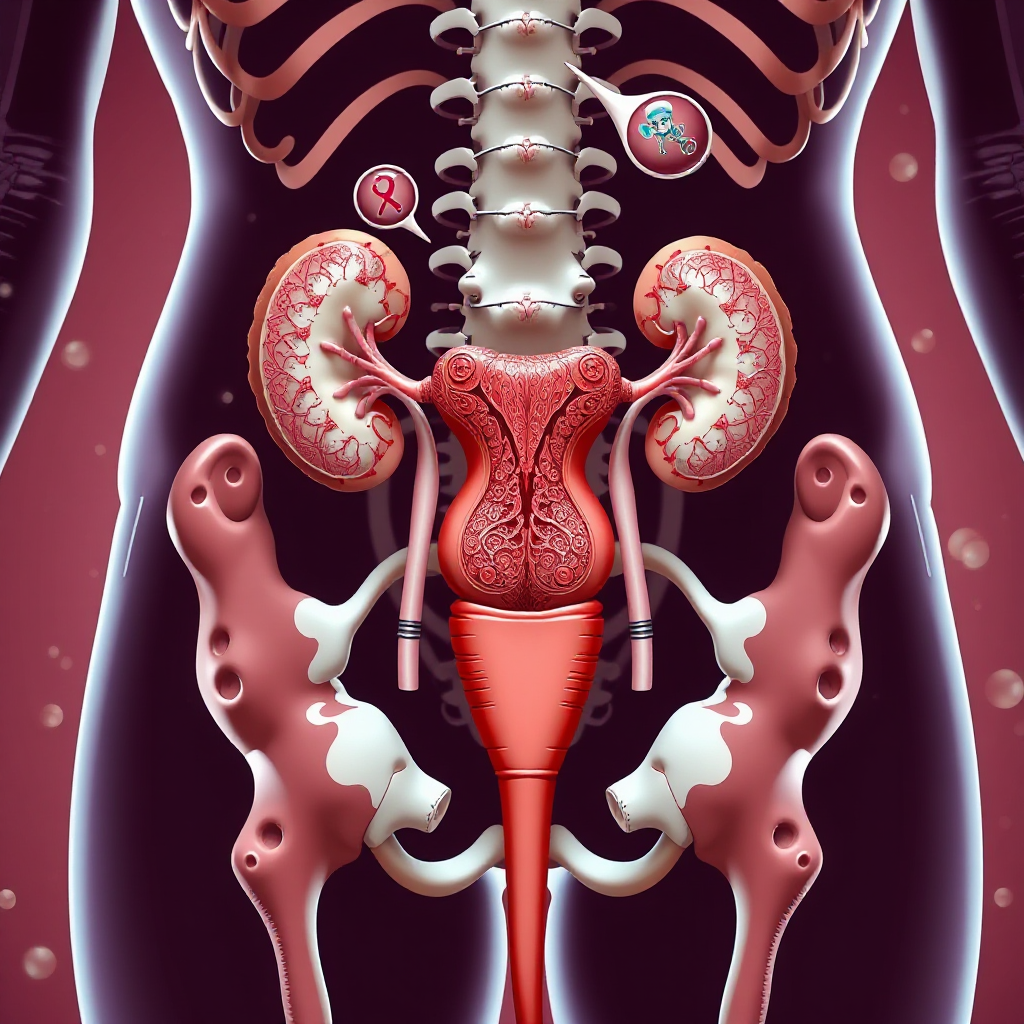What Is Renal Pelvis and Ureter Transitional Cell Cancer

Renal pelvis and ureter transitional cell cancer is a rare disease that develops in the transitional cells lining the renal pelvis and ureter. These cells play a crucial role in the urinary system by allowing flexibility as urine passes through. This cancer typically affects adults aged 65 or older. Though uncommon, it accounts for 7% of kidney tumors and 4% of upper urinary tract cancers. You should know that this type of cancer can spread to other parts of the body, making early detection essential.
Key Takeaways
Look for early signs like blood in urine or back pain. Finding it early can make treatment work better.
Know risks like smoking and long-term urinary infections. Controlling these can lower your chance of cancer.
See a doctor if you have strange urinary problems. Quick care is important for proper diagnosis.
Visit your doctor often after treatment. Regular check-ups can catch cancer if it comes back.
Make healthy changes, like stopping smoking and drinking more water. These habits improve health and reduce cancer risks.
Symptoms and Signs

Early Symptoms
Detecting renal pelvis and ureter transitional cell cancer early can improve outcomes. You should watch for the following symptoms:
Blood in the urine (hematuria): This is the most common early sign. You may notice your urine turning pink, red, or brown. Even if the bleeding is painless, it should not be ignored.
Pain in the back or side: Persistent pain in your lower back or side could indicate a problem in the urinary tract.
Frequent or painful urination: You might experience a burning sensation or feel the need to urinate more often than usual.
These symptoms often overlap with other urinary conditions, so consulting a healthcare provider is essential for an accurate diagnosis.
Advanced Symptoms
As the cancer progresses, you may notice more severe symptoms. These include:
Fatigue and weight loss: Feeling unusually tired or losing weight without trying could signal advanced disease.
Swelling in the legs or lower back: Blockages in the urinary tract may lead to fluid buildup, causing noticeable swelling.
Difficulty passing urine: You might find it hard to urinate or feel like your bladder is not emptying completely.
Note: Advanced symptoms often indicate that the cancer has spread beyond the urinary tract. Seeking medical attention promptly can help manage the condition effectively.
By recognizing these symptoms early, you can take proactive steps toward diagnosis and treatment. Always prioritize your health and consult a doctor if you notice any unusual changes.
Causes and Risk Factors
Causes
Genetic mutations in transitional cells
Renal pelvis and ureter transitional cell cancer often begins with genetic changes in the transitional cells lining the urinary tract. These mutations can cause the cells to grow uncontrollably, leading to cancer. While the exact triggers for these mutations remain unclear, researchers believe that genetic predisposition may play a role in some cases.
Chronic irritation of the urinary tract
Chronic irritation or inflammation in the urinary tract significantly increases the risk of developing this cancer. Conditions like recurring urinary tract infections or kidney stones can damage the lining of the renal pelvis and ureter. Over time, this persistent irritation may lead to the transformation of normal transitional cells into cancerous ones. Studies show that more than 90% of cancers in these regions originate from transitional cells altered by chronic irritation.
Tip: If you experience frequent urinary tract infections or kidney stones, consult your doctor to manage these conditions and reduce potential risks.
Risk Factors
Smoking and tobacco use
Smoking is one of the most significant risk factors for this type of cancer. Harmful chemicals in tobacco can enter your bloodstream and concentrate in the urine, directly affecting the cells lining the urinary tract. This exposure increases the likelihood of developing transitional cell cancer.
Personal history of bladder cancer
If you have had bladder cancer in the past, your risk of developing renal pelvis and ureter transitional cell cancer increases. This connection highlights the importance of regular follow-ups and monitoring for individuals with a history of urinary tract cancers.
Exposure to industrial chemicals
Certain industrial chemicals also elevate your risk. Occupational exposure to agents used in the petrochemical, plastic, and tar industries has been linked to this cancer. Additionally, dyes and chemicals used in manufacturing leather goods, textiles, and rubber can increase the likelihood of developing transitional cell cancer.
Chronic urinary tract infections or kidney stones
Recurring urinary tract infections or kidney stones not only cause discomfort but also increase your cancer risk. These conditions can lead to long-term inflammation, which may alter the cells lining the urinary tract and make them more susceptible to cancerous changes.
By understanding these causes and risk factors, you can take proactive steps to reduce your risk and seek medical advice when necessary.
Diagnosis
Initial Evaluation
Medical history and physical examination
Your doctor will begin by reviewing your medical history and performing a physical examination. They will ask about symptoms like blood in the urine or pain in your back. A thorough physical exam helps identify any swelling or tenderness that might indicate issues in the urinary tract.
Urine tests (e.g., cytology)
Urine cytology is a common test during the initial evaluation. This laboratory test examines a urine sample under a microscope to detect abnormal cells. Cancer in the kidney, bladder, or ureter often sheds cancerous cells into the urine. Identifying these cells can help confirm the presence of renal pelvis and ureter transitional cell cancer.
Imaging Tests
CT scan or MRI
Imaging tests play a crucial role in diagnosing this cancer. A CT scan uses X-rays to create detailed images of the renal pelvis and ureter. Sometimes, a dye is injected into a vein or swallowed to enhance the images. An MRI, on the other hand, uses magnets and radio waves to produce highly detailed pictures of the pelvis. These tests help locate tumors and assess their size and spread.
Ultrasound
Ultrasound is another effective imaging method. It uses high-energy sound waves to create images of internal organs. This test can help detect abnormalities in the renal pelvis and ureter, aiding in early diagnosis.
Biopsy and Cystoscopy
Ureteroscopy to collect tissue samples
If imaging tests suggest cancer, your doctor may recommend a ureteroscopy. This procedure involves inserting a thin, flexible tube with a camera into the ureter. It allows the doctor to view the affected area and collect tissue samples for further analysis.
Pathological examination of biopsy samples
The collected tissue samples undergo a pathological examination. A pathologist examines the samples under a microscope to confirm the presence of cancer cells. This step is essential for diagnosing renal pelvis and ureter transitional cell cancer and determining its stage.
Tip: Early and accurate diagnosis improves treatment outcomes. If you notice symptoms, consult your doctor promptly for evaluation.
Treatment Options
Surgical Treatments
Nephroureterectomy (removal of kidney and ureter)
Nephroureterectomy is the most common surgical treatment for renal pelvis and ureter transitional cell cancer. This procedure involves removing the affected kidney, ureter, and a portion of the bladder cuff. It is often recommended for advanced or invasive cancers. The success of this surgery depends on the cancer stage. For example, patients with early-stage cancer (Tis or Ta) have a 5-year survival rate of 82-100%. However, for advanced stages like T4, the survival rate drops to 12-14%.
Cancer Stage | 5-Year Survival Rate |
|---|---|
Tis | 82-100% |
Ta | 93-100% |
T1 | 91-95% |
T2 | 70-75% |
T3 | 40-54% |
T4 | 12-14% |
All Stages | ~57% (unadjusted) |
Segmental ureterectomy (partial removal of the ureter)
Segmental ureterectomy is an option for cancers confined to the lower third of the ureter. During this procedure, only the affected segment of the ureter is removed. The remaining ureter is then reattached to the bladder. This approach preserves kidney function and is suitable for patients with localized, superficial tumors.
Non-Surgical Treatments
Chemotherapy
Chemotherapy uses drugs to kill cancer cells or stop their growth. Regional chemotherapy, where drugs are delivered directly to the renal pelvis or ureter, targets cancer cells more precisely. This method minimizes side effects compared to systemic chemotherapy.
Immunotherapy
Immunotherapy boosts your immune system to fight cancer. Regional immunotherapy involves applying immunotherapy agents directly to the affected area. While this approach shows promise, its effectiveness requires further research.
Radiation therapy
Radiation therapy uses high-energy rays to destroy cancer cells. It is often used as a palliative treatment to relieve symptoms in advanced cases. Combining radiation with other treatments may improve outcomes.
Treatment Type | Description | Effectiveness |
|---|---|---|
Intrapelvic or intraureteral cytotoxic/immunotherapy | Direct application of chemotherapy or immunotherapy agents into the renal pelvis or ureter. | Limited experience; effectiveness not well established due to preliminary results. |
Laser therapy | Utilizes laser technology to target cancer cells. | Effectiveness not specified; requires further evaluation. |
Follow-Up Care
Regular imaging and urine tests
After treatment, regular follow-ups are essential. Imaging tests like CT scans and urine cytology help monitor for recurrence. Early detection of new tumors improves long-term outcomes.
Lifestyle changes to reduce recurrence risk
Adopting healthy habits can lower your risk of recurrence. Quitting smoking, staying hydrated, and managing chronic conditions like kidney stones or infections are crucial steps. These changes support overall urinary tract health and reduce cancer risks.
Tip: Consistent follow-up care and lifestyle adjustments can significantly improve your prognosis.
Stages and Progression

Staging Overview
Understanding the stages of renal pelvis and ureter transitional cell cancer helps you grasp how far the disease has advanced. Doctors use the TNM staging system to classify the cancer. This system evaluates tumor size (T), lymph node involvement (N), and metastasis (M). Clinical staging often involves imaging tests, ureteroscopy, and biopsy to determine the extent of the disease.
Stage 0: Cancer is confined to the inner lining
At this stage, the cancer remains in the inner lining of the renal pelvis or ureter. It has not invaded deeper tissues. Early detection at this stage offers the best chance for successful treatment.
Stage I: Cancer has invaded the connective tissue
Here, the cancer spreads beyond the inner lining into the connective tissue. Although it has not yet reached the muscle layer, treatment becomes more complex.
Stage II: Cancer has spread to the muscle layer
In this stage, the cancer invades the muscle layer of the renal pelvis or ureter. This progression increases the risk of the disease spreading to nearby areas.
Stage III: Cancer has reached surrounding tissues or organs
Stage III indicates that the cancer has extended into surrounding tissues or organs, such as the kidney or fat around the ureter. This stage often requires more aggressive treatment.
Stage IV: Cancer has metastasized to distant organs
At this advanced stage, the cancer spreads to distant organs like the lungs or liver. Treatment focuses on managing symptoms and slowing disease progression.
How the Cancer Progresses
From localized to advanced stages
Renal pelvis and ureter transitional cell cancer progresses differently in each patient. Factors like tumor size, grade, and location influence how quickly the disease advances. The TNM staging system helps doctors understand the extent of the cancer and plan treatment.
Factors influencing progression (e.g., tumor grade)
Several factors affect how the cancer progresses:
The stage and grade of the tumor
The tumor's location within the urinary tract
The health of your other kidney
Whether the cancer has recurred
Tumor grade also plays a critical role. High-grade tumors grow and spread faster than low-grade ones. Early detection and treatment can slow progression and improve outcomes.
Tip: Regular check-ups and imaging tests can help monitor the cancer's progression and guide treatment decisions.
Prognosis and Outlook
Survival Rates
Based on stage at diagnosis
The survival rates for renal pelvis and ureter transitional cell cancer depend heavily on the stage at diagnosis. Early-stage cancers confined to the subepithelial connective tissue have a significantly better prognosis compared to advanced stages. The table below highlights the median survival times based on the cancer's progression:
Stage of Cancer | Median Survival (Months) |
|---|---|
Confined to subepithelial connective tissue | |
Invading muscularis and beyond | 12.9 |
This data emphasizes the importance of early detection in improving survival outcomes.
Impact of early detection on outcomes
Detecting this cancer early can dramatically improve your prognosis.
Most cases can be cured if identified in the early stages.
Early-stage tumors show significantly better survival rates compared to advanced ones.
By recognizing symptoms early and seeking medical advice, you increase your chances of successful treatment.
Factors Affecting Prognosis
Age and overall health
Your age and overall health play a critical role in determining your prognosis. Older patients often face a poorer outlook due to additional health conditions and the aggressive nature of advanced cancers. The table below outlines key factors that influence survival rates:
Factor | Description |
|---|---|
Age | Older patients have a poorer prognosis due to clinical course and comorbidities. |
Tumor Stage | Advanced stages correlate with lower survival rates. |
Overall Health | Underlying health issues can negatively impact survival rates. |
Metastasis | Presence of distant metastases leads to worse survival outcomes. |
Response to treatment
Your response to treatment also affects your outlook. Patients with early-stage cancer often respond better to therapies like surgery or chemotherapy. However, advanced stages or recurrent cancers may require more aggressive treatments, which can impact overall survival.
Living with the Condition
Coping strategies and support
Living with renal pelvis and ureter transitional cell cancer can be challenging, but you can take steps to manage it effectively:
Join support groups to connect with others facing similar challenges.
Seek counseling to address emotional and mental health concerns.
Maintain a healthy lifestyle to improve your overall well-being.
Tip: Surround yourself with a strong support system of family, friends, and healthcare professionals to navigate the journey.
Importance of follow-up care
Regular follow-up care is essential for monitoring your condition and preventing recurrence. Your doctor may recommend periodic imaging tests and urine cytology to detect any new tumors early. Adopting healthy habits, such as quitting smoking and staying hydrated, can further reduce your risk of recurrence.
By staying proactive and informed, you can improve your quality of life and manage the condition more effectively.
Renal pelvis and ureter transitional cell cancer is a rare condition that begins in the transitional cells lining the renal pelvis and ureter. Key risk factors include smoking and a history of bladder cancer. Common symptoms, such as blood in the urine and back pain, often lead to diagnosis through physical exams, imaging, and urine tests. Treatment options range from surgery to chemotherapy, depending on the stage and spread of the cancer.
Early detection plays a vital role in improving outcomes. You should consult a healthcare provider if you notice unusual symptoms. Regular follow-ups and lifestyle changes can also help manage risks and improve your prognosis. Always seek personalized advice from medical professionals to guide your care.
FAQ
What is the difference between renal pelvis and ureter transitional cell cancer and bladder cancer?
Renal pelvis and ureter transitional cell cancer affects the upper urinary tract, while bladder cancer occurs in the bladder. Both involve transitional cells but differ in location and treatment approaches.
Can renal pelvis and ureter transitional cell cancer be prevented?
You can reduce your risk by avoiding smoking, staying hydrated, and managing chronic urinary conditions like infections or kidney stones. Regular check-ups also help detect issues early.
How is this cancer different from kidney cancer?
Kidney cancer typically originates in the kidney's tissues, such as renal cells. Renal pelvis and ureter transitional cell cancer starts in the lining of the urinary tract, affecting transitional cells.
Is this cancer hereditary?
Most cases are not hereditary. However, a family history of urinary tract cancers may slightly increase your risk. Genetic counseling can provide more insights if you have concerns.
What should you do if you notice blood in your urine?
Blood in your urine requires immediate medical attention. It could indicate renal pelvis and ureter transitional cell cancer or other conditions like infections or kidney stones. Early evaluation is crucial.
Tip: Always consult a healthcare provider for any unusual urinary symptoms to ensure timely diagnosis and treatment.
See Also
Identifying the Signs of Kidney Cancer You Should Know
Understanding Bladder Cancer: Symptoms and Contributing Factors
An Overview of Leydig Cell Tumors and Their Origins
Exploring Extragonadal Germ Cell Tumors and Their Development

